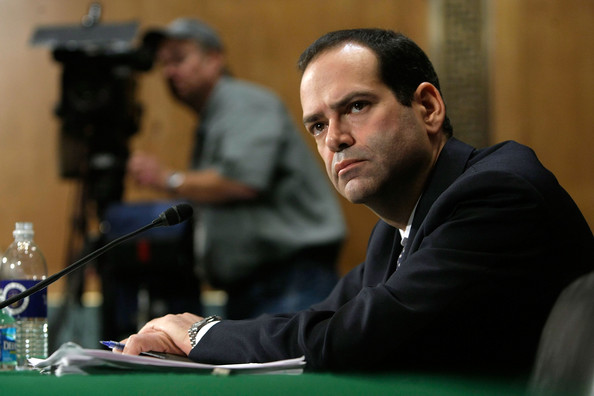 Treasury Special Inspector General for the TARP, Neil Barofsky, made public his long-awaited report Tuesday morning. It's a dense 250 page document that wiped out my entire Tuesday. Among the more interesting assertions: the Geithner PPIP could facilitate money laundering by organized criminal enterprises; Barofsky and staff are pursuing 20 criminal investigations into various forms of bailout fraud; and a report addendum from Treasury agency lawyers argues that firms participating in the Geithner bank bailout program (PPIP) would likely be subject to compensation restrictions.
Treasury Special Inspector General for the TARP, Neil Barofsky, made public his long-awaited report Tuesday morning. It's a dense 250 page document that wiped out my entire Tuesday. Among the more interesting assertions: the Geithner PPIP could facilitate money laundering by organized criminal enterprises; Barofsky and staff are pursuing 20 criminal investigations into various forms of bailout fraud; and a report addendum from Treasury agency lawyers argues that firms participating in the Geithner bank bailout program (PPIP) would likely be subject to compensation restrictions.
Links and video after the jump.
Executive Pay Limits Could Doom Geithner's PPIP (wash po)
The PPIP and Potential For Fraud (forbes)
Fraud Concerns Take Center Stage In Government Circles (housing wire)
Bank Aid Programs Are Open To Fraud (ny times)
Barofsky Worried About Criminal Money-Laundering with PPIP (felix salmon)
20 Criminal Cases Already for TARP (LA times)
Taxpayers Getting Screwed Again (clusterstock)
From Reuters:
The U.S. Treasury's plan to purge toxic assets from banks' balance sheets is vulnerable to fraud and abuse and needs tough rules against conflict of interest, the government's bailout watchdog said on Tuesday.
Neil Barofsky, the special inspector general for the $700 billion Troubled Asset Relief Program (TARP), said in a report that subsidies for public-private investment partnerships (PPIP) to buy assets could expose taxpayers to higher losses without corresponding increases in the potential for profit.
"Aspects of PPIP make it inherently vulnerable to fraud, waste and abuse, including significant issues relating to conflicts of interest facing fund managers, collusion between participants and vulnerabilities to money laundering," said Barofky's second quarterly report since he took office in December.
He called on the Treasury to impose strict rules to screen investors in such funds and for the disclosure of ownership stakes and all transactions in them. Managers running them should comply with "know your customer" requirements for banks and brokers under anti-money-laundering laws.
The Treasury is accepting, through Friday, asset managers' applications to run public-private investment funds to buy illiquid securities backed by troubled mortgages that are owned by banks. This is part of its plan to sell off up to $1 trillion in toxic assets that are constraining bank lending.
The Treasury is expected to name initial fund managers on May 15, with asset purchases to commence sometime in the ensuing weeks and months.
TAXPAYER RISKS
Barofsky's report called the plan, and a corresponding expansion of a Federal Reserve securities loan program to up to $1 trillion, a "tremendous expansion in the scope, scale and complexity of the TARP."
It warned of higher risks associated with investing in toxic securities, and said taxpayers could suffer bigger losses if public-private investment funds were allowed to finance securities purchases by borrowing from the Fed's Term Asset-Backed Securities Loan Facility.
The taxpayers' subsidies could dilute private investors' financial commitments, or "'skin in the game' and therefore reduce their incentive to conduct appropriate due diligence," the report said.
In a response to a draft of the report, the Treasury's administrator for TARP, Neel Kashkari, said the Treasury will consider the suggestions.
"As you recommendations make clear, there are risks associated with investing in or lending against legacy assets, which is in part why markets for them are currently frozen," Kashkari said in an April 14 letter attached to the report.
Barofsky's report confirmed that his office has opened nearly 20 preliminary and full criminal investigations associated with the $700 billion bailout program. These range from large corporate and securities fraud matters affecting TARP investments to insider trading, public corruption and mortgage modification fraud. It did not disclose any specific cases.
The inspector general's office is now conducting six audits, including one on whether recent bonus payments to American International Group employees complied with government aid conditions and whether Treasury was aware of the full range of compensation plans at the company.
The report said Treasury had committed $590.4 billion of the $700 billion through March 31, but when additional Fed financing commitments and asset guarantees are added in, taxpayers could be responsible for up to $2.977 trillion in total TARP costs.